英语笔译综合(时体态式)
catti《笔译综合能力》 -回复
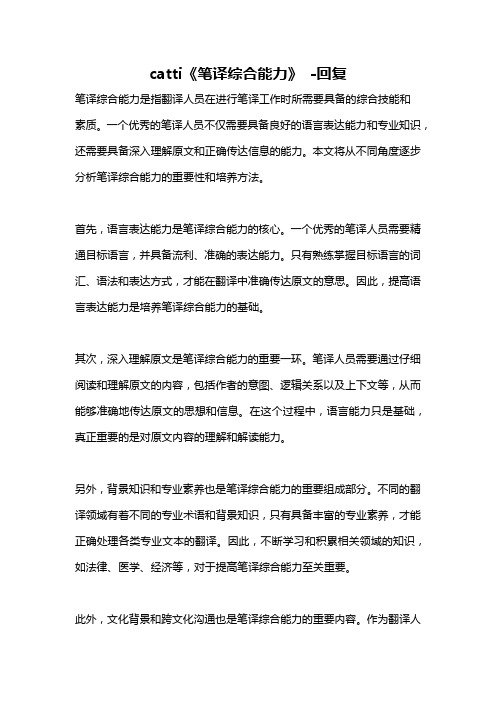
catti《笔译综合能力》-回复笔译综合能力是指翻译人员在进行笔译工作时所需要具备的综合技能和素质。
一个优秀的笔译人员不仅需要具备良好的语言表达能力和专业知识,还需要具备深入理解原文和正确传达信息的能力。
本文将从不同角度逐步分析笔译综合能力的重要性和培养方法。
首先,语言表达能力是笔译综合能力的核心。
一个优秀的笔译人员需要精通目标语言,并具备流利、准确的表达能力。
只有熟练掌握目标语言的词汇、语法和表达方式,才能在翻译中准确传达原文的意思。
因此,提高语言表达能力是培养笔译综合能力的基础。
其次,深入理解原文是笔译综合能力的重要一环。
笔译人员需要通过仔细阅读和理解原文的内容,包括作者的意图、逻辑关系以及上下文等,从而能够准确地传达原文的思想和信息。
在这个过程中,语言能力只是基础,真正重要的是对原文内容的理解和解读能力。
另外,背景知识和专业素养也是笔译综合能力的重要组成部分。
不同的翻译领域有着不同的专业术语和背景知识,只有具备丰富的专业素养,才能正确处理各类专业文本的翻译。
因此,不断学习和积累相关领域的知识,如法律、医学、经济等,对于提高笔译综合能力至关重要。
此外,文化背景和跨文化沟通也是笔译综合能力的重要内容。
作为翻译人员,不仅需要熟悉目标语言的文化背景,还需要了解原文的文化内涵和背景,以便在翻译中保持准确性和适应性。
同时,要注意在跨文化沟通中的礼貌和文化差异,以免出现尴尬或误解。
良好的解决问题和应变能力也是笔译综合能力的重要组成部分。
在翻译过程中,可能会遇到各种问题和难题,如不确定的词义、歧义的短语和文化的差异等。
一个优秀的笔译人员需要能够灵活应对,通过不断的学习和总结,积累解决问题的经验,并能够在翻译中做出正确的决策。
最后,持续学习和自我提升是培养笔译综合能力的关键。
语言和专业知识都是不断更新和变化的,只有不断学习和保持对新知识的敏感性,才能跟上时代的发展和需求。
通过参加培训课程、阅读专业资料和与其他翻译人员的交流,可以不断提升自己的翻译水平和综合能力。
动词的时、体、态、式概说
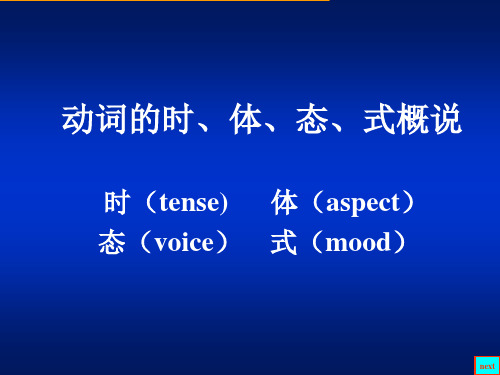
祈使句是以动词祈使式开首,表示命令、指示、 要求、建议、劝告等意义的特殊句式。
next
现代英语祈使句有三种类型: a. 第二人称祈使句 Come and have dinner with us.
有时为了强调对谁提出要求或发出指示,可将 you表示出来,这种you要重读。 Don’t you forget it. 有时还可在you之后再加上一个表示“义务”的 情态动词will,进一步提高祈使口气的强硬度。 You will mind your own business!
next
3. 陈述式、祈使式、虚拟式 式(mood)/ 语气: 区别说话人以何种口气 说话的动词形式
陈述式 indicative mood 祈使式 imperative mood 虚拟式 subjunctive mood
next
祈使句imperative sentence (P. 327)
Which of the following sentences is a COMMAND? (TEM4-2011-52) C A. Beg your pardon. B. Have a good time. C. Never do that again! D. What noise you are making!
动词的时、体、态、式概说
时(tense) 体(aspect) 态(voice) 式(mood)
next
1. 动词的时和体 时 tense——表示时间区别的动词形式 现代英语只有现在时和过去时 体 aspect—— 动作在一定时间内处于何种状态的 动词形式,有两种: 进行体(progressive aspect) 完成体(perfective aspect) 时和体相互结合,组成英语中的8种时、体形式
动词的时体态式
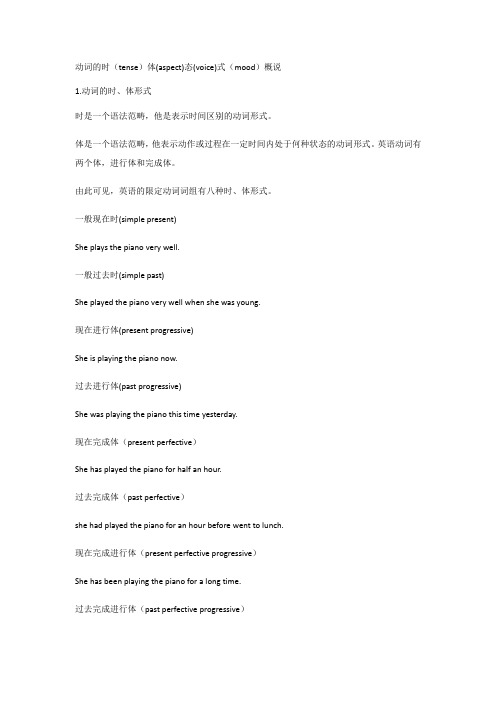
动词的时(tense)体(aspect)态(voice)式(mood)概说1.动词的时、体形式时是一个语法范畴,他是表示时间区别的动词形式。
体是一个语法范畴,他表示动作或过程在一定时间内处于何种状态的动词形式。
英语动词有两个体,进行体和完成体。
由此可见,英语的限定动词词组有八种时、体形式。
一般现在时(simple present)She plays the piano very well.一般过去时(simple past)She played the piano very well when she was young.现在进行体(present progressive)She is playing the piano now.过去进行体(past progressive)She was playing the piano this time yesterday.现在完成体(present perfective)She has played the piano for half an hour.过去完成体(past perfective)she had played the piano for an hour before went to lunch.现在完成进行体(present perfective progressive)She has been playing the piano for a long time.过去完成进行体(past perfective progressive)By 10 o’clock she had been playing the piano for two hours.2.主动态和被动态语态是一个语法范畴,他表示主语和谓语动词之间的主动或被动关系的语法形式。
英语动词有两种语态,主动态和被动态。
被动态可以由助动词be 的一定形式加及物动词的-ed分词构成.被动语态也有不同的时体形式。
笔译三级综合能力语态练习试卷1(题后含答案及解析)
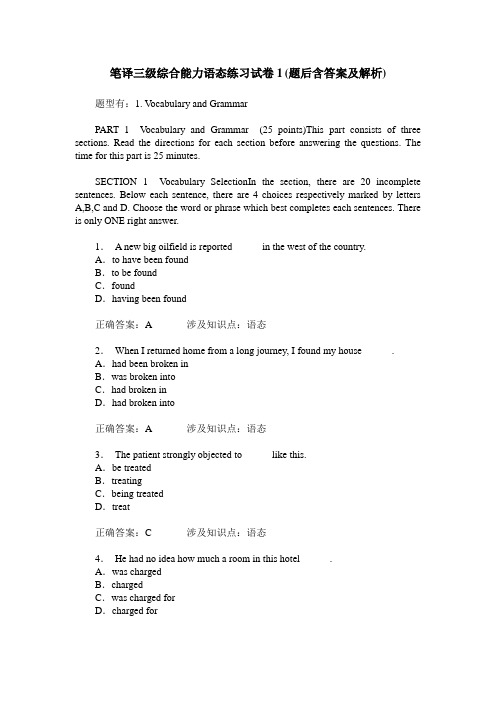
笔译三级综合能力语态练习试卷1(题后含答案及解析) 题型有:1. V ocabulary and GrammarPART 1 V ocabulary and Grammar (25 points)This part consists of three sections. Read the directions for each section before answering the questions. The time for this part is 25 minutes.SECTION 1 V ocabulary SelectionIn the section, there are 20 incomplete sentences. Below each sentence, there are 4 choices respectively marked by letters A,B,C and D. Choose the word or phrase which best completes each sentences. There is only ONE right answer.1.A new big oilfield is reported______in the west of the country.A.to have been foundB.to be foundC.foundD.having been found正确答案:A 涉及知识点:语态2.When I returned home from a long journey, I found my house______.A.had been broken inB.was broken intoC.had broken inD.had broken into正确答案:A 涉及知识点:语态3.The patient strongly objected to______like this.A.be treatedB.treatingC.being treatedD.treat正确答案:C 涉及知识点:语态4.He had no idea how much a room in this hotel______.A.was chargedB.chargedC.was charged forD.charged for正确答案:C 涉及知识点:语态5.He______in the emergency room when I arrived at the hospital.A.has been treatingB.has treatedC.had treatedD.was being treated正确答案:D 涉及知识点:语态6.The decoration of the hall’s______but it’s not yet______with lamps.A.furnished, finishedB.been finished, been furnishedC.being finished, being furnishedD.furnish, finish正确答案:B 涉及知识点:语态7.She never expected______the chairwoman of the committee.A.to electB.to be electingC.to be electedD.be elected正确答案:C 涉及知识点:语态8.Since the introduction of the new technique, the production cost______greatly.A.reducesB.has been reducedC.is reducingD.is reduced正确答案:B 涉及知识点:语态9.The food shows no sign of______.A.touchedB.being touchedC.having been touchedD.having touched正确答案:C 涉及知识点:语态10.No one can avoid______by advertisements.A.being influencedB.influencingC.having influencedD.to be influenced正确答案:A 涉及知识点:语态11.The doctor said that the patient had______at once.A.to operateB.to be operatedC.to operate onD.to be operated on正确答案:D 涉及知识点:语态12.The fifth generation computers, with artificial intelligence,______and perfected now.A.developedB.have developedC.are being developedD.will have been developed正确答案:C 涉及知识点:语态13.Eighty-two people were reported______in the plane crash.A.to have injuredB.to have been injuredC.injuredD.injuring正确答案:B 涉及知识点:语态14.Greater efforts to increase agricultural production must______if food shortage is to be avoided.A.be madeB.makeC.have madeD.have been made正确答案:A 涉及知识点:语态15.I assure you that the matter______as quickly as possible. Have a little patience.A.has been attended toB.will be attended toC.is attended toD.has attended to正确答案:B 涉及知识点:语态16.I’ll take down your name and address in case you______as a witness.A.are neededB.have neededC.needD.were needed正确答案:A 涉及知识点:语态17.Men and women______equal wages for equal jobs in China.A.are paidB.paidC.being paidD.to be paid正确答案:A 涉及知识点:语态18.If one______by vanity, he will be very particular about others’clothing and appearance.A.overcomesB.will be overcomeC.is overcomeD.has overcome正确答案:C 涉及知识点:语态19.Don’t be late.I hate______waiting for a long time.A.being keepingB.be keptC.to be keptD.be keeping正确答案:C 涉及知识点:语态20.Most environmental problems exist because adequate measures for preventing them______ in the past.A.was not takenB.were not takenC.didn’t takeD.haven’t taken正确答案:B 涉及知识点:语态21.People whose property______should report to the police.A.had stolenB.is being stolenC.has been stolenD.had been stolen正确答案:C 涉及知识点:语态22.By promoting more even income distribution in a developing country, a lower birth rate will______.A.be achievedB.achieveC.have been achievedD.be achieving正确答案:A 涉及知识点:语态23.He______the leader of the Model Group in our factory.A.has just been appointedB.has just appointedC.just appointedD.has just being appointed正确答案:A 涉及知识点:语态24.He______to return earlier than 3 o’clock.A.was not expectedB.did not expectC.not to be expectedD.was not expect正确答案:A 涉及知识点:语态25.We should keep ourselves______of the latest developments.A.informingB.informedC.to informD.inform正确答案:B 涉及知识点:语态26.We got down to business as soon as we______each other.A.had introduced toB.had been introduced toC.had introduced byD.had been introduced by正确答案:B 涉及知识点:语态27.Besides______, he had to pay back all the money he had received from bribes.A.jailingB.being jailedC.to be jailedD.jailed正确答案:B 涉及知识点:语态28.The riot is said______by the government’s negligence of the people’s welfare.A.to have been causedB.being causedC.to be causedD.to cause正确答案:A 涉及知识点:语态29.Large sums of money______each year in painting the steelwork of bridges, ships, and other exposed structures.A.have spentB.have to be spentC.have to spendD.have to be spending正确答案:B 涉及知识点:语态30.I found that my cheating in yesterday’s English test______to my parents that very evening.A.was reportedB.had been reportedC.had reportedD.was being reported正确答案:A 涉及知识点:语态。
2019年catti二级笔译综合能力试题及答案解析(一)
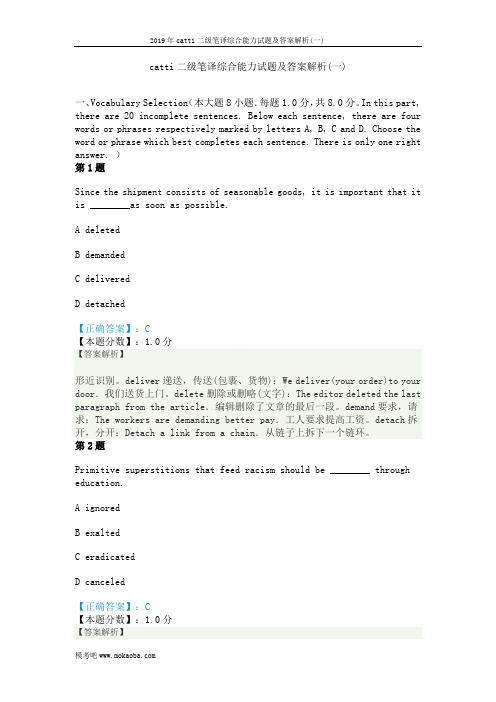
catti二级笔译综合能力试题及答案解析(一)一、Vocabulary Selection(本大题8小题.每题1.0分,共8.0分。
In this part, there are 20 incomplete sentences. Below each sentence, there are four words or phrases respectively marked by letters A, B, C and D. Choose the word or phrase which best completes each sentence. There is only one right answer. )第1题Since the shipment consists of seasonable goods, it is important that it is ________as soon as possible.A deletedB demandedC deliveredD detached【正确答案】:C【本题分数】:1.0分【答案解析】形近识别。
deliver递送,传送(包裹、货物):We deliver(your order)to your door.我们送货上门。
delete删除或删略(文字):The editor deleted the last paragraph from the article.编辑删除了文章的最后一段。
demand要求,请求:The workers are demanding better pay.工人要求提高工资。
detach拆开,分开:Detach a link from a chain.从链子上拆下一个链环。
第2题Primitive superstitions that feed racism should be ________ through education.A ignoredB exaltedC eradicatedD canceled【正确答案】:C【本题分数】:1.0分【答案解析】词义辨析。
简述动词的时体态式
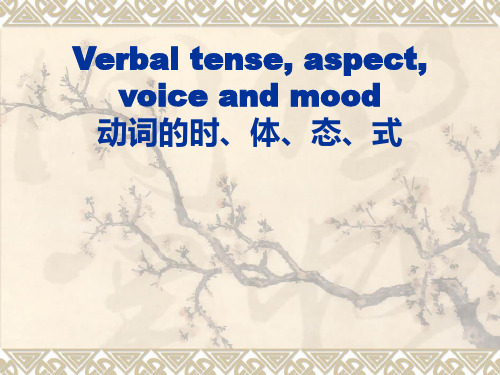
differences between tenses and time
❖ Time is a concept universally existent and tense may be a grammatical device or vocabulary device specific to a language.
❖ Present perfective progressive ❖ She has been playing the piano for a long time. ❖ Past perfective progressive ❖ By 10 o’clock she had been playing the piano
❖ Tense is inflectional and aspect analytical. Tense refers to a systematic set of inflectional features that are loosely related to time, while aspect is usually expressed through the use of certain vocabulary devices.
❖ 【语法】 语气:用来强调说话人对表达的行为或条件 的真实性或可能性所持有态度的一系列动词形态或变 化形式。
Types of moods
❖ Indicative mood: factual statement or question
❖ Imperative mood: command ❖ Subjunctive mood: hypothetical/non-factual
❖ Tense usually points to temporal locations and aspect generally marks the state of an action— whether it is completed or not.
英语笔译综合能力3级-Lesson2(单词与习惯用语)
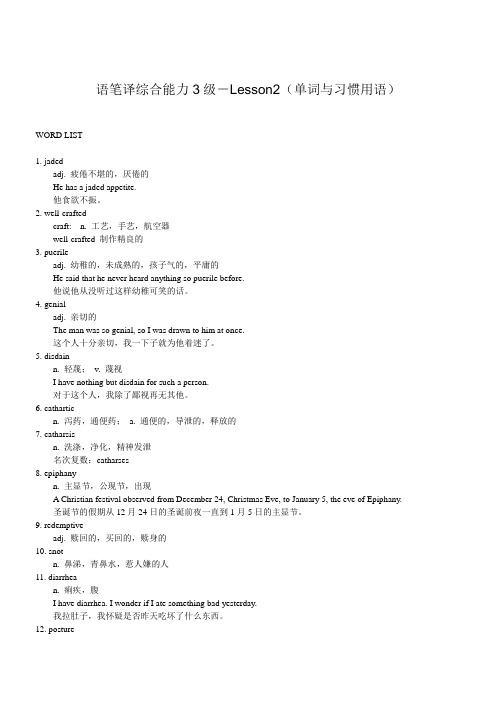
语笔译综合能力3级-Lesson2(单词与习惯用语)WORD LIST----------------------------------------------------1. jadedadj. 疲倦不堪的,厌倦的He has a jaded appetite.他食欲不振。
2. well-craftedcraft: n. 工艺,手艺,航空器well-crafted 制作精良的3. puerileadj. 幼稚的,未成熟的,孩子气的,平庸的He said that he never heard anything so puerile before.他说他从没听过这样幼稚可笑的话。
4. genialadj. 亲切的The man was so genial, so I was drawn to him at once.这个人十分亲切,我一下子就为他着迷了。
5. disdainn. 轻蔑;v. 蔑视I have nothing but disdain for such a person.对于这个人,我除了鄙视再无其他。
6. catharticn. 泻药,通便药;a. 通便的,导泄的,释放的7. catharsisn. 洗涤,净化,精神发泄名次复数:catharses8. epiphanyn. 主显节,公现节,出现A Christian festival observed from December 24, Christmas Eve, to January 5, the eve of Epiphany.圣诞节的假期从12月24日的圣诞前夜一直到1月5日的主显节。
9. redemptiveadj. 赎回的,买回的,赎身的10. snotn. 鼻涕,青鼻水,惹人嫌的人11. diarrhean. 痢疾,腹I have diarrhea. I wonder if I ate something bad yesterday.我拉肚子,我怀疑是否昨天吃坏了什么东西。
catti三级笔译综合能力考试试题及答案解析(一)
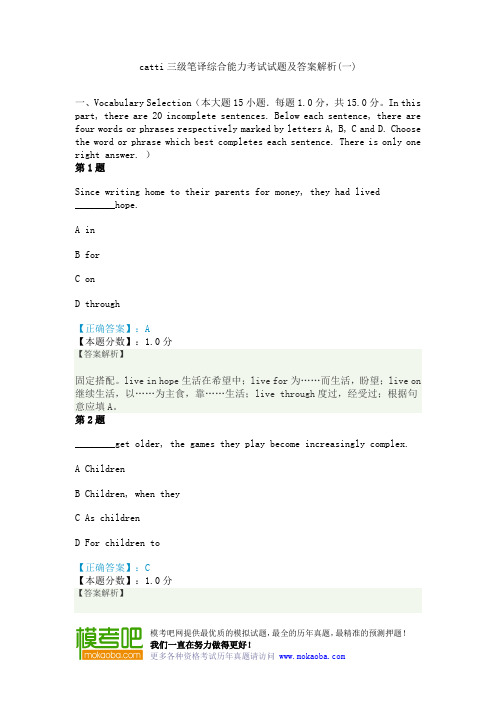
catti三级笔译综合能力考试试题及答案解析(一)一、Vocabulary Selection(本大题15小题.每题1.0分,共15.0分。
In this part, there are 20 incomplete sentences. Below each sentence, there are four words or phrases respectively marked by letters A, B, C and D. Choose the word or phrase which best completes each sentence. There is only one right answer. )第1题Since writing home to their parents for money, they had lived________hope.A inB forC onD through【正确答案】:A【本题分数】:1.0分【答案解析】固定搭配。
live in hope生活在希望中;live for为……而生活,盼望;live on 继续生活,以……为主食,靠……生活;live through度过,经受过;根据句意应填A。
第2题________get older, the games they play become increasingly complex.A ChildrenB Children, when theyC As childrenD For children to【正确答案】:C【本题分数】:1.0分【答案解析】模考吧网提供最优质的模拟试题,最全的历年真题,最精准的预测押题!语法应用。
本句逗号前是状语从句,空白处应填连词;主句主语是the games,因此选项A、B、D均不对;只有as“随着”符合句意,所以C为答案。
第3题Martin has created enough memorable ________to make it easy to forgive his lows.A youngstersB noblesC highsD miserables【正确答案】:C【本题分数】:1.0分【答案解析】固定搭配。
笔译三级综合能力语态练习试卷4(题后含答案及解析)
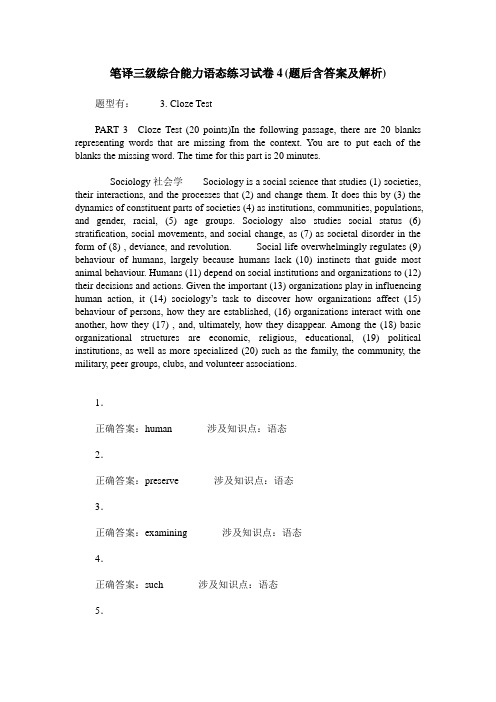
笔译三级综合能力语态练习试卷4(题后含答案及解析) 题型有: 3. Cloze TestPART 3 Cloze Test (20 points)In the following passage, there are 20 blanks representing words that are missing from the context. You are to put each of the blanks the missing word. The time for this part is 20 minutes.Sociology社会学Sociology is a social science that studies (1) societies, their interactions, and the processes that (2) and change them. It does this by (3) the dynamics of constituent parts of societies (4) as institutions, communities, populations, and gender, racial, (5) age groups. Sociology also studies social status (6) stratification, social movements, and social change, as (7) as societal disorder in the form of (8) , deviance, and revolution. Social life overwhelmingly regulates (9) behaviour of humans, largely because humans lack (10) instincts that guide most animal behaviour. Humans (11) depend on social institutions and organizations to (12) their decisions and actions. Given the important (13) organizations play in influencing human action, it (14) sociology’s task to discover how organizations affect (15) behaviour of persons, how they are established, (16) organizations interact with one another, how they (17) , and, ultimately, how they disappear. Among the (18) basic organizational structures are economic, religious, educational, (19) political institutions, as well as more specialized (20) such as the family, the community, the military, peer groups, clubs, and volunteer associations.1.正确答案:human 涉及知识点:语态2.正确答案:preserve 涉及知识点:语态3.正确答案:examining 涉及知识点:语态4.正确答案:such 涉及知识点:语态5.6.正确答案:or 涉及知识点:语态7.正确答案:well 涉及知识点:语态8.正确答案:crime 涉及知识点:语态9.正确答案:the 涉及知识点:语态10.正确答案:the 涉及知识点:语态11.正确答案:therefore 涉及知识点:语态12.正确答案:inform 涉及知识点:语态13.正确答案:role 涉及知识点:语态14.正确答案:is 涉及知识点:语态15.正确答案:the 涉及知识点:语态16.17.正确答案:decay 涉及知识点:语态18.正确答案:most 涉及知识点:语态19.正确答案:and 涉及知识点:语态20.正确答案:institutions 涉及知识点:语态。
笔译综合能力英语三级

笔译综合能力英语三级
一、词汇知识
笔译综合能力英语三级考试要求考生具备较丰富的词汇知识,能够熟练运用常用词汇和短语进行书面表达。
考试中会涉及不同领域的词汇,要求考生能够准确理解并正确使用这些词汇。
因此,考生需要通过不断积累和记忆词汇,提高自己的词汇量,以应对考试中的各种词汇测试。
二、语法规则
笔译综合能力英语三级考试要求考生熟练掌握英语语法规则,能够正确理解和运用各种时态、语态、语气等语法形式。
同时,考生还需要了解和掌握一些常见的英语句型和表达方式,以便在翻译过程中更加准确地表达原文的意思。
因此,考生需要通过不断练习和学习,提高自己的语法水平。
三、阅读理解
笔译综合能力英语三级考试中的阅读理解部分要求考生具备较高的阅读能力和理解能力。
考生需要能够快速阅读并理解各种类型的英文材料,包括新闻报道、科技文章、商业信函等。
同时,考生还需要具备一定的推理和判断能力,以便准确把握文章的主旨和细节。
为了提高阅读理解能力,考生需要通过大量阅读和练习来提高自己的阅读速度和理解能力。
四、翻译技巧
笔译综合能力英语三级考试中的翻译技巧部分要求考生熟练掌
握各种翻译技巧和方法,包括直译、意译、增译、减译等。
同时,考生还需要了解一些常见的翻译问题和解决方案,例如处理歧义、传达文化背景等。
在考试中,考生需要准确地将英文原文翻译成中文,同时保证译文流畅、准确、符合中文表达习惯。
为了提高翻译技巧,考生需要通过不断练习和实践来提高自己的翻译水平。
动词时态
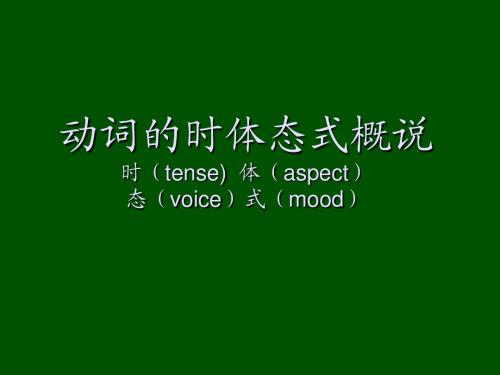
• Translate the following two sentences: He has written to me frequently since I was ill. He has written to me frequently since I have been ill. 自从我病愈以来,他经常给我来信。 自从我生病以来(现在还在病中),他经常给 我来信
完成体与since 完成体与since 分句
1. Since分句——非持续性动词的一般过去 时 主句——现在完成体 2. 主句为 it be… 表示时间,be 可以用一 般现在时代替现在完成时 It is three months since he wrote to me.
3. Since 分句中用持续性动词和静态动词的一 般过去时 The house has been in bad repair since he lived in it. ( The house has been in bad repair since he moved out.) I haven’t eaten snails since I was a student at Indiana. ( I haven’t eaten… since I left Indiana University.)
• 按计划安排将发生的过去将来的事 • 现在时间和将来时间里的动作 (1)委婉——hope, wonder, want I was wondering if you’d like to come with me. 过去进行体比一般过去时更委婉
(2)主观臆想
• 表示现在时间的主观想法 I wish they were not talking so loudly. It is time we were leaving. • 将来时间的主观想法 I’d rather you were going at once. If you were leaving tonight, I’d like to go with you. 这些句子中过去进行体可与一般过去时互 换
时体态式的英文表达
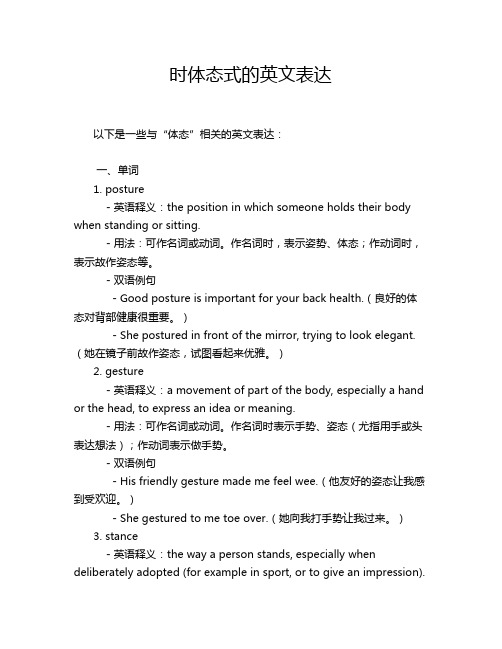
时体态式的英文表达以下是一些与“体态”相关的英文表达:一、单词1. posture- 英语释义:the position in which someone holds their body when standing or sitting.- 用法:可作名词或动词。
作名词时,表示姿势、体态;作动词时,表示故作姿态等。
- 双语例句- Good posture is important for your back health.(良好的体态对背部健康很重要。
)- She postured in front of the mirror, trying to look elegant.(她在镜子前故作姿态,试图看起来优雅。
)2. gesture- 英语释义:a movement of part of the body, especially a hand or the head, to express an idea or meaning.- 用法:可作名词或动词。
作名词时表示手势、姿态(尤指用手或头表达想法);作动词表示做手势。
- 双语例句- His friendly gesture made me feel wee.(他友好的姿态让我感到受欢迎。
)- She gestured to me toe over.(她向我打手势让我过来。
)3. stance- 英语释义:the way a person stands, especially when deliberately adopted (for example in sport, or to give an impression).- 用法:主要作名词,表示站立姿势、姿态(尤指故意采用的,如在运动中或为了给人某种印象)。
- 双语例句- His stance in the boxing ring was very defensive.(他在拳击台上的站姿非常具有防御性。
catti三笔综合clozing

catti三笔综合clozing
CATTI三笔综合共100分,全是选择题。
1.全国翻译专业资格考试简称CATTI,是受国家人力资源和社会保障部委托,由中国外文出版发行事业局负责实施与管理的一项国家级职业资格考试,是对参试人员口译或笔译方面双语互译能力和水平的评价与认定。
2.三级笔译考试一共100分,都是选择题,分为三个大部分。
第一部分是60道题,一分一个,前20道题是语法填空,跟专四差不多。
中间20题是同义词替换,最后20题是改错的那种,画横线的部分有错误,需要变换时态或者其他的。
第二部分是三篇阅读,共30个选择题,总计30分。
一篇阅读下设10个选择题。
第三部分是完形填空,共20个选择题,总计10分。
3.设立这一考试的目的是为适应中国经济发展和加入世界贸易组织的需要,加强中国外语翻译专业人才队伍建设,科学、客观、公正地评价翻译专业人才水平和能力。
catti综合题型
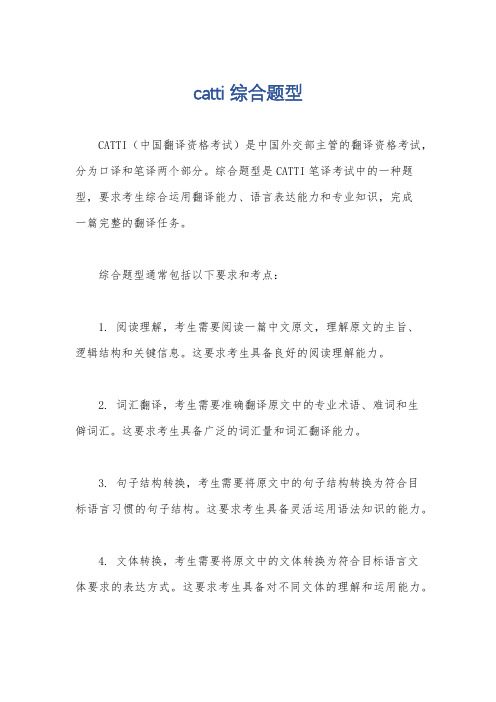
catti综合题型CATTI(中国翻译资格考试)是中国外交部主管的翻译资格考试,分为口译和笔译两个部分。
综合题型是CATTI笔译考试中的一种题型,要求考生综合运用翻译能力、语言表达能力和专业知识,完成一篇完整的翻译任务。
综合题型通常包括以下要求和考点:1. 阅读理解,考生需要阅读一篇中文原文,理解原文的主旨、逻辑结构和关键信息。
这要求考生具备良好的阅读理解能力。
2. 词汇翻译,考生需要准确翻译原文中的专业术语、难词和生僻词汇。
这要求考生具备广泛的词汇量和词汇翻译能力。
3. 句子结构转换,考生需要将原文中的句子结构转换为符合目标语言习惯的句子结构。
这要求考生具备灵活运用语法知识的能力。
4. 文体转换,考生需要将原文中的文体转换为符合目标语言文体要求的表达方式。
这要求考生具备对不同文体的理解和运用能力。
5. 语篇连贯,考生需要将原文中的段落和句子连接起来,保持翻译文的语篇连贯性。
这要求考生具备良好的语言组织和表达能力。
在回答综合题型的考题时,考生需要注意以下几点:1. 理解原文,仔细阅读原文,把握原文的主旨和要点,确保对原文的理解准确。
2. 翻译准确,准确翻译原文中的词汇和句子,注意专业术语的翻译,避免出现错误或歧义。
3. 语言流畅,注意语言的表达方式和语法结构,使译文流畅自然,符合目标语言的习惯表达。
4. 语境适应,根据原文的语境和文体要求,选择合适的表达方式和词汇,使译文贴近原文的风格和意义。
5. 校对修改,在完成翻译后,仔细校对译文,确保译文的准确性和连贯性,对错误进行修改。
综合题型要求考生具备扎实的语言基础、广泛的知识面和良好的翻译能力。
通过不断的练习和积累,考生可以提高自己的翻译水平,更好地应对CATTI考试中的综合题型。
笔译

英语笔译综合(时体态式)

if-分句中,表示和讲话人的信念或期待相反 的意思。 If you really worked hard, you would soon get promoted. It’s time we all took a rest.
将来时间表示法
1. will/shall+ 不定式
常常含有情态意义即带有说话人的主观态度 和看法,可表示预见(prediction),意愿 (willingness)或意图(intention) take this medicine and. You’ll feel better in an hour or so. We shall ensure that the repairs are carried out according to your wishes.
4. 现在进行体
表示按计划,安排即将发生的动作。现在进 行体的将来用法只限于由人类的努力所致的 动作。因而,象The tree are losing their leaves soon.的句子是不恰当的,因为它表示 树木对它的将来有控制能力了。同样, He’s dying next week只能指某种策划中的死亡, 例如处决。 I’m taking the children to the zoo.
Tense: the relationship between the form of the
verb and the time of the action or state it describes. In English, verbs may be in the past or present tense.
He was eventually to end up in the bankruptcy
英语动词的时态、体态与式态
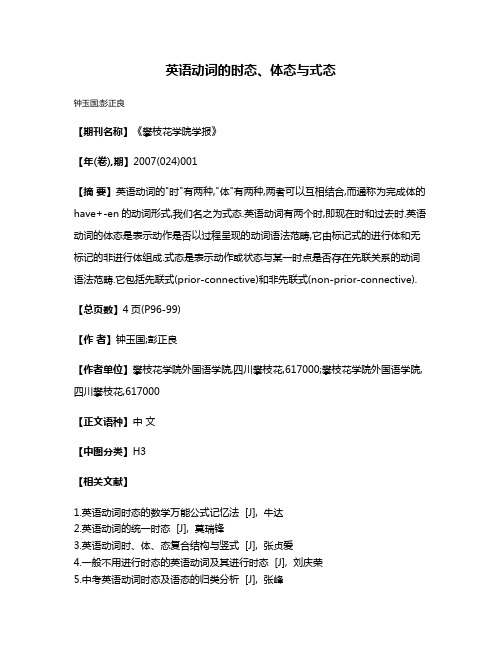
英语动词的时态、体态与式态
钟玉国;彭正良
【期刊名称】《攀枝花学院学报》
【年(卷),期】2007(024)001
【摘要】英语动词的"时"有两种,"体"有两种,两者可以互相结合,而通称为完成体的have+-en的动词形式,我们名之为式态.英语动词有两个时,即现在时和过去时.英语动词的体态是表示动作是否以过程呈现的动词语法范畴,它由标记式的进行体和无标记的非进行体组成.式态是表示动作或状态与某一时点是否存在先联关系的动词语法范畴.它包括先联式(prior-connective)和非先联式(non-prior-connective).【总页数】4页(P96-99)
【作者】钟玉国;彭正良
【作者单位】攀枝花学院外国语学院,四川攀枝花,617000;攀枝花学院外国语学院,四川攀枝花,617000
【正文语种】中文
【中图分类】H3
【相关文献】
1.英语动词时态的数学万能公式记忆法 [J], 牛达
2.英语动词的统一时态 [J], 莫瑞锋
3.英语动词时、体、态复合结构与竖式 [J], 张贞爱
4.一般不用进行时态的英语动词及其进行时态 [J], 刘庆荣
5.中考英语动词时态及语态的归类分析 [J], 张峰
因版权原因,仅展示原文概要,查看原文内容请购买。
- 1、下载文档前请自行甄别文档内容的完整性,平台不提供额外的编辑、内容补充、找答案等附加服务。
- 2、"仅部分预览"的文档,不可在线预览部分如存在完整性等问题,可反馈申请退款(可完整预览的文档不适用该条件!)。
- 3、如文档侵犯您的权益,请联系客服反馈,我们会尽快为您处理(人工客服工作时间:9:00-18:30)。
2. will/shall+ 不定式进行体/完成体
will/shall+不定式带有情态意义,而要表示纯粹将 来,可用will/shall+不定式进行体结构。 When you reach the end of the bridge, I’ll be waiting there to show you the way. We’ll be flying at 30000 feet. 这句话由驾驶员对乘 客说的话,意思就是“三万英尺是这次飞行正常和 预期的高度” We’ll fly at 30000 feet. 如果是这个结构,给人的 感觉会不一样:很可能是驾驶员刚刚决定在这一高 度上飞行。
4. 现在进行体
表示按计划,安排即将发生的动作。现在进 行体的将来用法只限于由人类的努力所致的 动作。因而,象The tree are losing their leaves soon.的句子是不恰当的,因为它表示 树木对它的将来有控制能力了。同样, He’s dying next week只能指某种策划中的死亡, 例如处决。 I’m taking the children to the zoo.
现在时表示非现在时间的特殊用法 表示过去的一般现在时 历史现在时描写仿佛现在正在发生的过去, 因为它传达了目击者的叙述具有某种戏剧 色彩的即时性。 I couldn’t believe it! Just as we arrived, up comes Ben and slaps me on the back as if we’re life-long friends. “Come on, old pal,” he says, “let me buy you a drink!” I’m telling you, I nearly fainted on the spot.
映的是讲话者探询的态度,而不是过去时间, 在下列句子中,现在时和过去时都指现在的 精神状态,但后者更为礼貌。 Do/did you want to see me now? I wonder/wondered if you could help us.
(2) 假设过去时,用于某些从属分句,尤其是
He was eventually to end up in the bankruptcy
court. The meeting was to be held the following week.
was/were about to+不定式(正要;带 有未实现的意图的意思)
He was about to hit me.
5.be to+不定式
表示按计划,安排即将发生的动作。常见于报纸,广播, 用于宣传官方的计划或决定。 China is to import some $1 trillion of goods and services in the next three years and the import market will expand much wider, said Wei Jianguo, Vice Minister of Commerce on September 24 at the third session on Pan-Yellow Sea economic and technical exchange between China, Japan and the Republic of Korea, held in Weihai, east China’s Shangdong Province. (Beijing Review) 表示命令、禁止或可能性等 You are to be back by 10 o’clock. be about to 的意思等同于be on the point of + v-ing 或be going to+just
过去进行体(过去预定的安排)和一般过去 时
I was meeting him in Bordeaux the next day. She told me that she would come to see me when
she visited China again.
was/were to+不定式(表示注定要发生和安 排好的事情)
Tense: the relationship between the form of the
verb and the time of the action or state it describes. In English, verbs may be in the past or present tense.
(二)句法的需求:英语重形合,注重句法结构和
表达形式。当主动句不便于表达时,由于造句的需 要或修辞的考虑,往往采用被动句。 为了使句子承上启下、前后连贯、便于衔接。 Some kinds of plastics can be forced through machines which separate them into long, thin strings, called “fibres”, and these fibres can be made into cloth. 为了使句子平衡,保持末端中心(end focus)和末 端重量(end weight),以符合主语简短,谓语复 杂的表达习惯。 I was astounded that he was preparing to give me a job.
3. be going to+不定式
表示意图,即打算在将来做某事。
When are you going to be married? 还可以表示预见,即现在已有迹象表明将要
发生或即将发生的某种情况。 It’s going to rain. She’s going to have a baby.
过去将来时间的表达
would +不定式
The time was not far off when he would regret this
decision. was/were going to+不定式 (常含有“未实现的意 图”) You were going to give me your address. (…but you didn’t)
施事不如受事重要,或受事需要强调
Her only son was run over by a car. 由于特殊的原因而需要指明施事,如为了使 叙述显得圆通、得体,或为了表达某种微妙 的情绪。 Some things have been said here tonight that ought not to have been spoken.
if-分句中,表示和讲话人的信念或期待相反 的意思。 If you really worked hard, you would soon get promoted. It’s time we all took a rest.
将来时间表示法
1. will/shall+ 不定式
常常含有情态意义即带有说话人的主观态度 和看法,可表示预见(prediction),意愿 (willingness)或意图(intention) take this medicine and. You’ll feel better in an hour or so. We shall ensure that the repairs are carried out according to your wishes.
能用一般现在时表示过去时间的动词有tell,say,
hear,learn,gather,understand等。 I hear that poor Mr. Simpson has gone into hospital.
这些句子如果使用一般过去时或者完成体也是可以
的;但现在时似乎意味着:尽管这些事件发生在过 去,但是它的结果还在发生作用。 The Book of Genesis speaks of the terrible fates of Sodom and 现在时是英语中除了will/shall结构外, 表示将来动作最普遍的方法。不过,只有在 从属分句中,一般现在时才常有这种将来用 法,照例都用在条件或时间连词如if和when 之后,也用在that分句中。 What will you say if I marry the boss? 也可用来描述不能更动的事件或预定活动, 不管它们是否由人的计划所决定 What time does the match begin?
Voice refers to the ways in which a language expresses
the relationship between a verb and the noun phrases which are associated with it. Two sentences can differ in voice and yet have the same basic meaning. However, there may be a change in emphasis and one type of sentence may be more appropriate. For example The wind damaged the fence. The wind is the subject of the verb damaged, which is in the active voice, while in The fence is damaged by the wind. The fence is the subject of the verb was damaged, which is in the passive voice.
